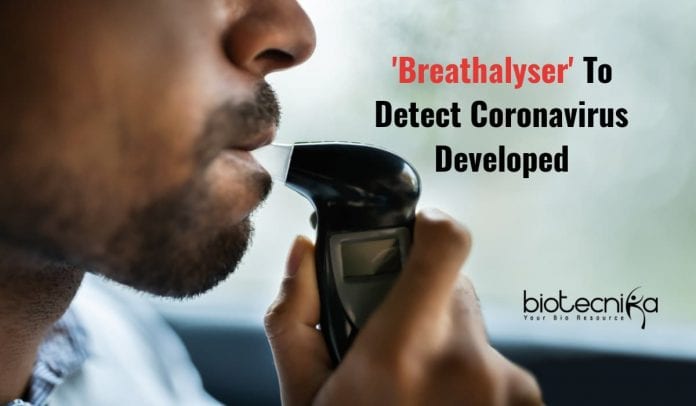Scientists Develop Breathalyser To Detect COVID-19
A prototype device that non-invasively detects the novel coronavirus in the exhaled breath of Covid-19 patients has been developed by a group of researchers, which, if validated, can lead to a reduction in the number of tests required to confirm the disease and thus lower the burden on the hospitals.
The current Covid-19 testing is uncomfortable as well as time-consuming, according to researchers, including those from the University of Science and Technology of China.
They said the healthcare systems need to be inexpensive, quick, and easy-to-use in order to reduce the mortality and transmission rates.
The study published in the journal ACS Nano developed a sensor similar to a breathalyser test for alcohol intoxication to detect COVID-19 in exhaled breath using special materials made of ultrasmall nanoparticles.
The device has an array of gold nanoparticles linked to molecules sensitive to different volatile organic compounds (VOCs) released by viruses and cells they invade. The scientists noted that the electrical resistance of the material changes when the VOCs interact with the molecules on a nanoparticle.
Using machine learning, researchers trained the device to detect COVID-19 by comparing the pattern of electrical resistance signals obtained from the
breath of 58 healthy controls and 33 non-Covid lung infection patients with that of 49 confirmed Covid-19 patients in Wuhan, China.Each participant had to blow into the device from a distance of one to two centimeters for two to three seconds during the process. A potential COVID-19 signature was identified by machine learning, which was then tested on a subset of participants to test the accuracy.
76% accuracy was shown by the device identifying those infected with COVID-19, and it was 98% accurate in distinguishing COVID-19 infected from other lung infections. Between sick and recovered COVID-19 patients, the device worked with 88% accuracy.
Further research is required to validate the device, but once validates, it could be used to determine individuals who need further testing from a large population.






























